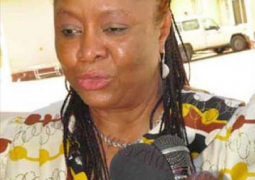
Mr. Halifa Sallah, the Director of the People's Centre who was the presidential candidate for the opposition NADD Alliance in the 2006 presidential election has raised eyebrows, questioning the legitimacy of the recent removal of Chief Justice Abdoukarim Savage and Speaker Fatoumatta Jahumpa-Ceesay.
Mr. Sallah, who was speaking at a press conference yesterday said, it is his realisation that a vacuum exists in our governance structure which each responsible citizen has a duty to fill. That vacuum, he added, is to have an alternative voice so that not only one voice is heard and that is the voice of the government.
According to him, "good governance comes through checks and balances between the arms of the state, the judiciary, legislature and the executive but when such checks and balances can no longer be effective, one can legitimately say that there is crisis of governance".
Dilating on the removal of former Chief Justice Savage from a constitutional point of view, Halifa noted that the objective of the constitution is very clear in the preamble; it is not a provision of the constitution but it reflects the spirit.
"What we are told in the constitution is very clear that the arms of the government has been clearly demarcated and that it is amply secured so that they would be able to operate independently".
"It is in essence simply saying that there is independent of the judiciary, the legislature and there is no encroachment of one authority over the other. But how is it possible for the executive to remove the Chief Justice from office", he queried. Quoting from the constitution, he said, Section 141 actually indicates that there is need for security of tenure of judges of superior courts, including the Chief Justice and that is why sub-section (2) makes it clear that they can retire after attaining the age of 65 years, but that a judge may also vacate that seat once the persons attain 70 years".
"But it also mentions that he or she can have his or her terminated by the President in consultation with the Judicial Service Commission or when they have infirmity of mind or misconduct under sub-section (4) and that is the point that needs to be looked at very clearly", he asserted.
This, he went on, "is what we call a just system of government but how can a person of the highest judicial office just be removed"?
For Mr. Sallah, it is very clear from this that members of the bar and bench need to sit down and look at this issue very seriously. "The judiciary must be independent and impartial. They should not be subjected to any form of control or direction by any other authority. But if these members could be removed, then clearly it will be difficult to convince anybody that the judiciary can also be independent", he added.
He said, "If the public is made to fear that a judge is not secure, then it will be very difficult to convince the public that the judiciary can also perform their responsibilities without any fear or favour".
On the issue of the Speaker, Mr. Sallah revealed that Section 93 of the constitution provides for the election of the Speaker and Deputy Speaker and in terms of vacating their seats, sub-section (3) of the same section shows the conditions under which the Speaker can vacate his or her office that is if the person seizes to be a member of the National Assembly, if he or she is removed from the office by a resolution of the National Assembly, supported by not less than two thirds of all the members.
"So it means that it is the members who elect the Speaker and they should be able to remove him or her. But where the President can remove a member of the National Assembly from office then that also is not in line with the standards of best practice; it does not show the independence of the legislature of the National Assembly," he concluded.



